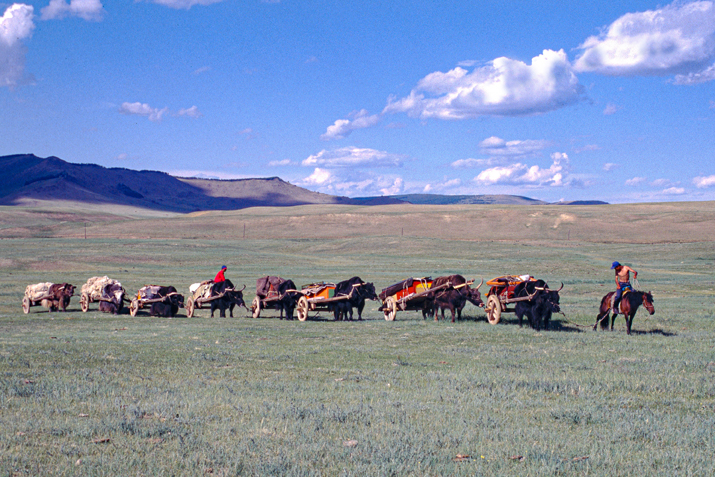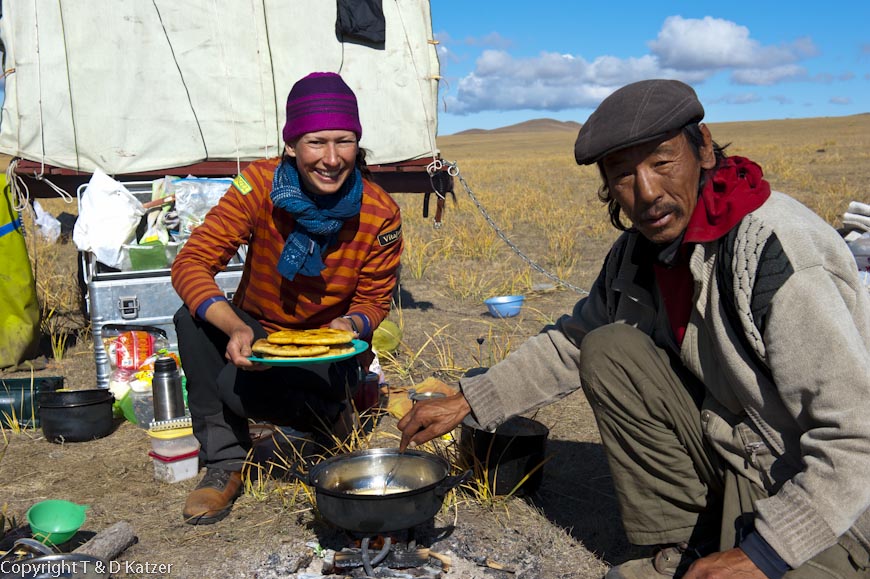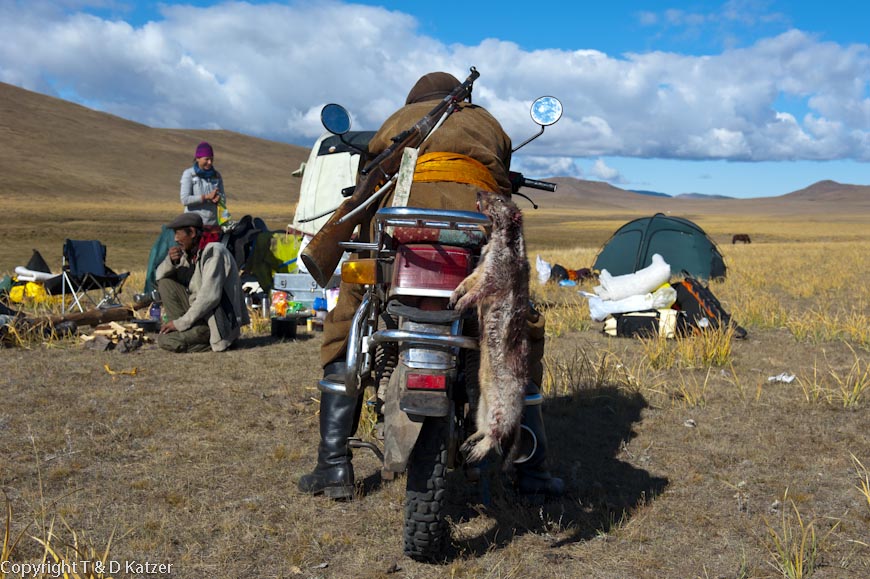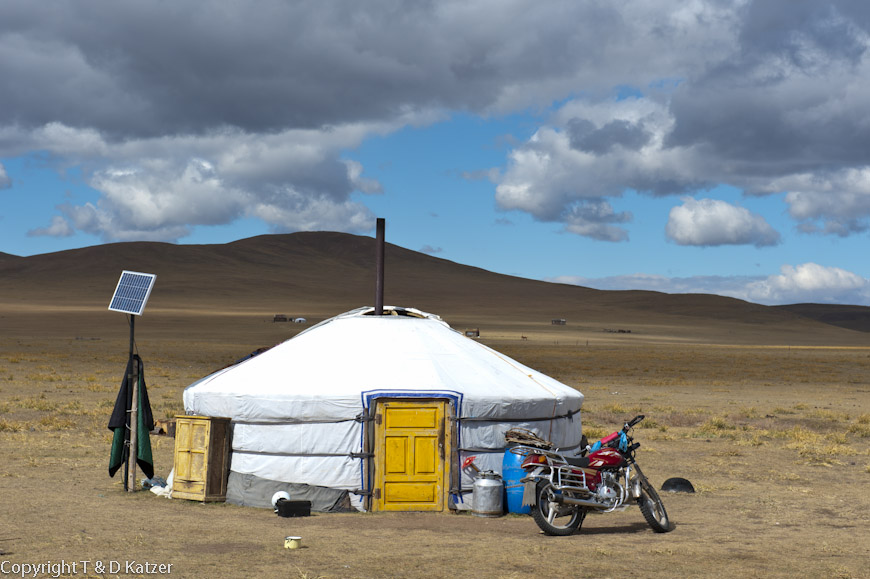
Bite of the cold
N 49°05'234'' E 101°38'619''
Day: 53
Sunrise:
06:49
Sunset:
19:28
As the crow flies:
17,05
Daily kilometers:
21
Total kilometers:
650
Soil condition:
Meadow
Temperature – Day (maximum):
14°C
Temperature – day (minimum):
4°C
Temperature – Night:
minus 12°
Latitude:
49°05’234”
Longitude:
101°38’619”
Maximum height:
1624 m above sea level
Time of departure:
13:00
Arrival time:
17:30



Today surprises us with a blue sky. Only a few clouds dot the firmament. Bilgee went hunting early on and gave Ulzii the task of kneading bread dough for gamber (flat bread baked in oil). We actually want to use the good weather to travel, but the Mongolian way of life is different. In this way, we have an enforced break that we are happy to accept. “Then we’ll manage fewer kilometers today,” I say, still getting used to the rhythm of leisureliness. At 11:00 Bilgee returns without success. It’s now a pleasant 14 degrees in the shade. Bilgee places the large pan on the fire, pours in a liter of rapeseed oil and waits until it starts to boil. He then places a patty prepared by Ulzii in the oil. After a short time, he takes out the gamber and lets it drip off. We immediately make our way over to the hot flatbread. Spread jam or chocolate cream on it and enjoy it with a hot cup of tea. I would love to try several of the Mongolian delicacies, but I can’t tolerate all the fat. Much of what Bilgee cooks or bakes is associated with oil or fat. Quite tasty but for someone who does not tolerate fat and oil well, an increasing burden on the body. I often reject his creations and try to be as diplomatic as possible. After a few bites of the damper, I eat a big bowl of semolina porridge with raisins, grated coconut and oat flakes.
As almost every day, we are visited by a nomad. His rifle shouldered, he sits on his Chinese moped and greets us in a reserved but friendly manner. As if he has known our companions for a long time, he starts a conversation with them. It’s about hunting. “Would you like to buy the marmot?” he asks me, pointing to the large rodent hanging from his carrier. “No thanks. We have a big hunter in the team ourselves,” I reply with a laugh, pointing at Bilgee.
We break camp at 13:00. I get into the saddle and lead Mogi next to Sar. Like every morning, Mogi is full of energy and literally explodes with zest for action. Without being able to react, it snatches its leash out of my hand. It shoots off like an arrow. Directly towards a herd of animals. Tanja and I have our pulses racing. I immediately gallop after them to avoid further drama. Thank goodness it’s not sheep grazing peacefully but cattle. Mogi loses interest, because cattle are not as easily bitten to death as sheep or at least terribly frightened and returns to the horse-drawn cart after several calls. We make very slow progress for the first few kilometers. Sharga loses another horseshoe. His hooves look terrible. His work as a draught horse for the timber transportation company meant that he had to toil from dawn to dusk every day. There was almost never any free time for the animal. Especially in winter, when people need wood for heating, there is no rest for such horses. His hooves are correspondingly worn. “We absolutely have to shoe him again at the next rest camp,” I say to Tanja, who is riding next to me. “Do we still have enough horseshoes with us?” “Two more. But that should be enough until Mörön. Hopefully we can buy new ones there,” I reply.
Bilgee swings into the saddle of his horse and pulls Sharga behind him. After a few minutes, he falls into a gentle trot. It goes on like this for hours. In the meantime, we have become accustomed to the effort of trotting. The initial pain in my knees has also disappeared. Our route takes us over lonely passes up to 1,700 meters high. “I lived here ten years ago. My yurt was over there,” explains Bilgee, pointing to the edge of the forest. “There was a lot of game in this region back then. I could hunt deer and wolves. Today you can hardly find any of them. They’re all shot away. Too many people can afford a gun these days and go hunting. That’s a problem for our animal population,” we hear, without overhearing the regret in his voice.
“Are these the graves of the nomads living here?” I ask Ulzii as we ride past roughly hewn gravestones standing in the middle of the steppe. “Yes, this is where the residents bury their relatives,” he confirms. I dismount and take a few photos. I’ve always wondered where the nomads who live away from the cities have their cemeteries. Here, in this place, I get a surprising answer. Thoughtfully, I swing myself back into the saddle to follow the horse-drawn carriage. At 17:30 we reach a meadow with high dry grass next to a larch forest. “There’s another pass ahead of us. Do you want to cross it today?” asks Bilgee. “Better we stay here and do the mountain tomorrow with fresh strength,” I reply, to which Bilgee nods sympathetically. After we have unsaddled and hobbled the horses, Bilgee sets off again in search of water. He returns before sunset. Baihgui Us”, (does not give water) he says.
We sit by the fire to warm ourselves. As soon as the sun has retreated behind the mountains, the thermometer drops to minus 7 degrees. “Looks like it’s going to be a particularly cold night,” I note, shivering. “Bilgee nods and points to the cloudless sky. Tanja and I pour hot water onto our ready-to-eat food. This means Tanja doesn’t have to cook for long and we can quickly retire to the tent. Bilgee and Ulzii, on the other hand, prepare meat and noodles. “Would you like some of that? It’s not goat. Moo, moo!”, Bilgee says to make me understand that he has cooked cow, which I can certainly tolerate better than goat. ‘I’d love to,’ I reply and eat my second evening meal ravenously. Because of the cold, the body burns a lot of energy and definitely needs more food than in summer. After dinner, I hold my hands over the fire, shivering. They are freezing cold. “Do you have enough blankets? If you want, you can take the two horse blankets into the tent. Zuger, zugeer!” (it’s all right, it’s all right), Ulzii replies.
Tanja is already lying in her sleeping bag when I grab into the tent. “If it gets any colder, I’ll have to think hard about riding as far as Chövsgöl Nuur (Chövsgöl Lake),” she says, suffering from the cold. Although it is only September 16, the thermometer drops to minus 12 degrees this night. If the temperatures continue to drop so rapidly, our goal for this year’s stage will be a long way off. I had expected up to minus 15 degrees at the end of this year’s leg of the journey. But not in September. During my shift from midnight to 2 a.m., I ask myself whether there is any point in getting that all-important sleep in these temperatures. I can hardly imagine whether I, as a thief, would go out stealing horses in these sub-zero temperatures. But who knows? We are in Mongolia here. Everything is different there. Perhaps it’s the cold temperatures that tempt a Mongol to go on the prowl?
It’s ten minutes past 2:00 in the morning. I have woken Bilgee for his shift and have just crawled back into my sleeping bag when Mogi starts barking like a madman. Not for the first time on this trip, I leave the tent because of his miserable barking. Then I rebuild Mogi’s wind and privacy screen. “So my friend, now you can’t see the stupid strange ghosts in the forest any more. I hope you’ll spare us your barking now,” I say to him who, as always in such a situation, looks at me with his tail wagging. Then I use the time to get rid of my dinner. The cold bites me horribly in the ass. You’d think a wolf had buried its teeth in it. Within a few minutes I’m hypothermic at minus 12 degrees. Despite the hot water bottle, it takes me a long time to get back to normal operating temperature in my sleeping bag and fall asleep.
We look forward to your comments!

